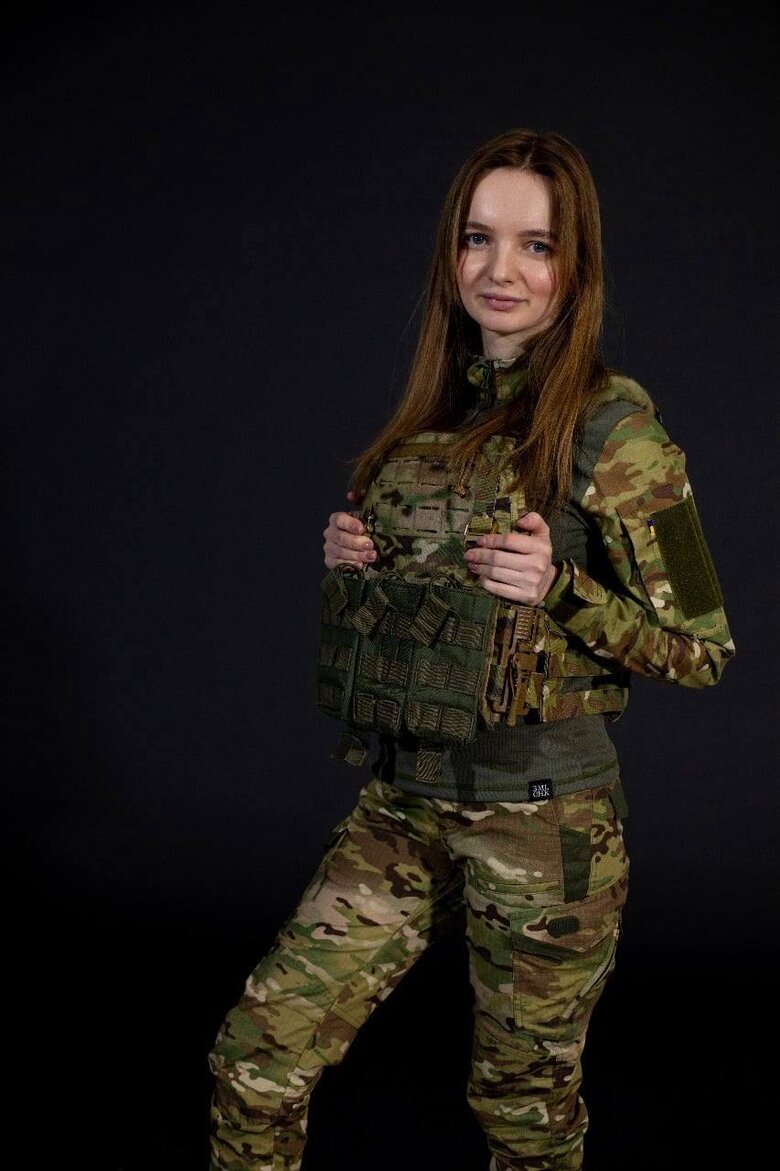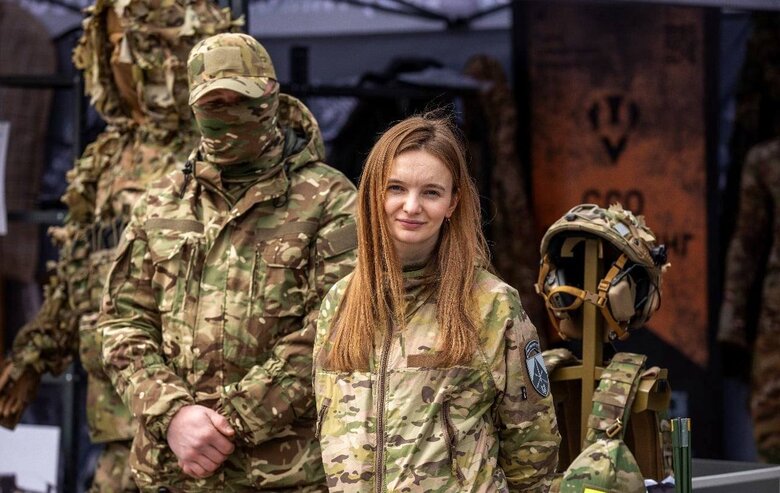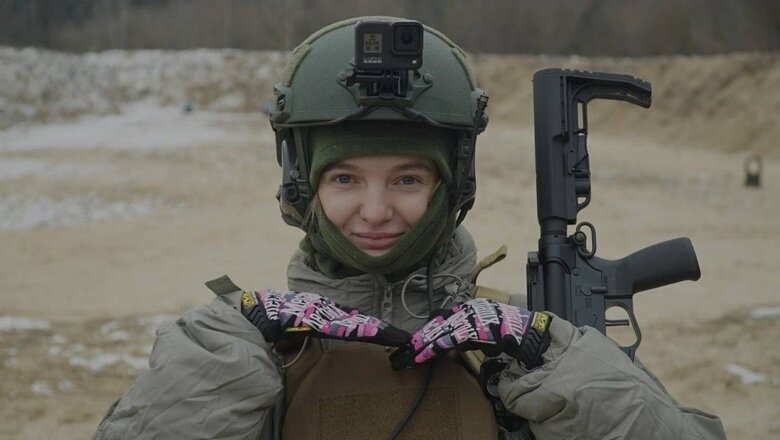Iskra’s fire: IFV gunner, serving while seven months pregnant, ambassador for SOF
The story of the officer from the 144th Center of the Special Operations Forces (SOF), call sign Iskra (Spark - ed.note), is truly remarkable. She lived in Donetsk until the age of 18 and moved to Kyiv in 2014 during the turbulent events in the East. She got a degree in marketing… and joined the Armed Forces of Ukraine.
She served in combat units of the Ground Forces as an assistant grenade launcher operator and gunner-operator on a BMP-2. At the height of the full-scale invasion, she joined the Special Operations Forces. At the same time, she is completing degrees at two law universities — Yaroslav Mudryi National Law University in Kharkiv and the National Academy of Internal Affairs.
— "In the spring of 2014, pro-Russian movements began in Donetsk, but at the same time, rallies were also held in support of a united Ukraine," Iskra recalls. "I was still in school back then and attended one of those rallies with friends from our local lyceum — they were football fans and the event took place in the city’s main square — Lenin Square. I remember the overwhelming aggression from provocateurs — at first verbal, but within minutes it escalated into chaos. The ‘separs’ (separatists are people who want their own separate government or are involved in separatist activities - ed. note) began prying up paving stones and throwing them at us. One of my friends was hit in the head…"
As the situation in the region worsened, I moved to Kyiv. My father worked in the police, and he was faced with a clear choice: either find a job in Ukrainian-controlled territory or cooperate with the self-proclaimed authorities and get a promotion. He chose the first option — packed up quickly and moved with my mother to a village near Pokrovsk. They lived there until the summer of 2024, when a Russian missile hit the yard of their private home. After that, they moved to the capital. My father is now retired, and my mother works as a nurse at one of the local institutions.
— How did your family react to your decision to join the Armed Forces?
—They definitely weren’t thrilled. And I understand them. I have a daughter, and I’m sure she’ll choose her own path — but honestly, I wouldn’t want to see her in the military one day.
My father, being a police officer, had hopes for me to build a career in the legal field. And I saw potential there too, but for various reasons, it didn’t work out at the time — I ended up with a degree in marketing instead.
Still, my family always supported me. Even when I had a assignment letter from a military unit in hand but spent two weeks running around the Pokrovsk TCR (Territorial Center of Recruitment and Social Support - ed.note) — constantly being ignored or passed around by the draft officers, as if to say, ‘Where do you think you're going, especially into a combat role?’ My father probably got tired of driving me to the district center every day and eventually reached out to some of his contacts to help get the paperwork processed. Soon after, I was already at the training center.
— How did you choose your unit in the infantry?
— It’s actually quite a story. While working as a news feed editor at the Interfax-Ukraine news agency, I was monitoring social media and came across a job ad for a position in the press service of the 72nd Mechanized Brigade. I told my boss I was sick...and went to Avdiivka instead.
Eventually, due to a twist of circumstances, I ended up getting an assignment letter in Volnovakha from the 28th Mechanized Brigade but that didn’t change anything. I was determined to join the military. From the very beginning of the war, my biggest dream was to be among the first who would enter liberated Donetsk. I want to celebrate our victory in my apartment in Donetsk, the one my parents bought just before the war. Who knows, maybe "DNR" (Donetsk People's Republic - ed. note) guys have already seized it... We’ve had no news about it since our evacuation.
— Let’s go back to your time in the Ground Forces — it turned out to be quite intense...
— Of course. I've been through so many training courses on rotations (smiles)! First, basic general military training, then the communications training centre, sergeant training courses, IFV (infantry fighting vehicle - ed. note ) commander training courses...
— When did you get your first combat experience?
— In 2018, near Marinka, I was serving as a rifleman and assistant grenade launcher operator. I fired the grenade launcher myself and took shifts at observation posts. Later, I went out on combat missions as a BMP-2 gunner-operator. There was plenty of work — aside from the romance of shooting, there were other things to deal with, like maintenance. I mean, who was going to clean the gun for me? Luckily, I had a good team, the guys helped out.
Long story short, I fulfilled my duties, including combat tasks, all the way up to the seventh month of pregnancy. I left the service in 2021, and after maternity leave, I returned in 2023 — this time with the SOF.
— Wait, up to the seventh month?! How did you manage that, and what did your comrades and commander say about it?
— The first two weeks were rough when I wasn’t feeling great at first, but overall, fortunately, the pregnancy was easy. Maybe I just didn’t want to psyche myself out; I didn’t fully grasp my condition and kept going on sheer enthusiasm.
I didn’t make my situation public — I didn’t want everyone to know. I kept it to myself until the very last moment. I remember one summer day when we were loading equipment in the forest. It was warm out, and I was wearing a fleece jacket. "Aren’t you hot?" the guys asked. "Just a bit under the weather," I said. "Got a bit of a fever." But my friend noticed anyway — even though my belly was still quite small, even at seven months.
From my point of view, I was trying to stay as effective and involved in the unit’s life as possible. Heading out in an IFV on New Year’s to send the Russians our regards — No problem. Helping the guys service the vehicle after a freezing -17°C shift — sure thing. Short-staffed in the kitchen? I can always jump in — I can cook. I’m basically a pretty versatile fighter. (smiles).
— So, at the start of the full-scale invasion, you were already a mom and a civilian...
— That’s exactly right. I was in Kyiv, finishing up my winter exams, and my daughter was staying with her grandmother. On the eve of the invasion, February 23, a former comrade came to visit me and my husband. The tension was already in the air — everyone could feel that something was about to happen, but deep down, we still didn’t believe it would go beyond Donetsk and Luhansk regions.
I woke up at 5:30 a.m., and the guys were already whispering to each other. I grabbed my phone, started scrolling through Facebook and browsing the web — and it was all clear: explosions in Kyiv, Kharkiv, Ivano-Frankivsk, Chernihiv… Like everyone else, I was in shock.
That same day, we hit the road. I headed to the Kirovohrad region to get my daughter, and my husband went toward Sievierodonetsk to rejoin his military unit. He promised he’d pick me up in a week — but, well… things didn’t exactly go as planned. My maternity leave got a little extended.
— How did you end up joining the Special Operations Forces?
— I’d heard about SOF back when I was serving with the 28th Brigade — guys from the 3rd Regiment visited our positions, and their stories about the Q-course were seriously inspiring. So when the opportunity came up in 2023 to join this truly exceptional group, I didn’t hesitate for long. My husband wasn’t exactly thrilled about me returning to the Armed Forces — said one family member in uniform was enough — but of course, in the end, he supported me.
— So, you have been in the SOF for two years now. What are your impressions?
— First and foremost, SOF is about People — with a capital P. When you’re part of a family where everyone understands each other without needing to say much, the work feels easier. Second — the weapons. Right now, they’re state-of-the-art, and in today’s warfare, that makes all the difference. Back when I served in reconnaissance, we worked with AKs and Mavics. Now, we have access to a wide range of automatic rifles and there’s no need to even mention how far UAV capabilities have come.
As for my current role, I serve as a personnel psychological support officer at the 144th Center.
— You’ve become an ambassador for the Special Operations Forces. What does this role mean to you?
— I feel a certain responsibility — both to myself and to our entire branch. It’s truly an honor. And honestly, a surprise, because SOF has so many worthy people with legendary combat experience.
The most important thing is that I want to be heard. People who are afraid to serve, who are hiding from the TCR, need to understand: no one is going to hand us victory on a silver platter. Everyone wants peace but to achieve it, we have to work for it.
Speaking of peace, I believe it’s not just about reclaiming our territory and raising the blue and yellow flag over it. We must also prevent the spread and entrenchment of the occupiers’ traditions and so-called values here in Ukraine.
As for SOF, there’s no shortage of work for our units and specialists to strengthen them. The SOF recruitment system looks for people across multiple platforms: call centers, the official website, social media, and recruitment offices in three cities. As an ambassador, I’m doing my part to explain to potential candidates that everyone can be useful. You can work with documents as a clerk, manage supplies in a warehouse, drive a vehicle, or serve as a scout. There are plenty of positions for all levels of knowledge and training. You’ll always have experienced comrades by your side, as well as training centers and instructors. What matters most is the willingness to work and to learn. With that on your side, no obstacle can stop a motivated person on the path to joining SOF.
5th SOF Recruitment Center
Our contacts:
Addresses:
- Building 1, 7 Obolonska Naberezhna Street, Kyiv city(9:00 AM – 6:00 PM)
- 2 Oleksandra Polia Avenue, Dnipro city (9:00 AM – 6:00 PM)
- 16 Soborna Street, Khmelnytskyi city (8:00 AM – 4:00 PM)




